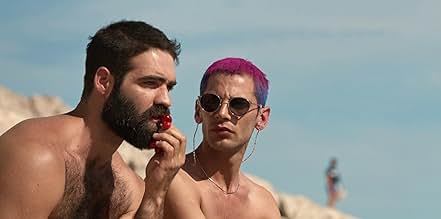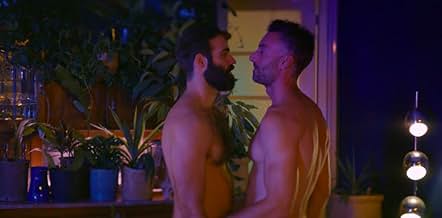AVALIAÇÃO DA IMDb
6,7/10
1,5 mil
SUA AVALIAÇÃO
Adicionar um enredo no seu idiomaWhile having a day-long swim at Athens' queer beach, best friends Demos and Nikitas recall the events of a recent summer in the prospect of turning them into a screenplay for Nikitas' featur... Ler tudoWhile having a day-long swim at Athens' queer beach, best friends Demos and Nikitas recall the events of a recent summer in the prospect of turning them into a screenplay for Nikitas' feature debut.While having a day-long swim at Athens' queer beach, best friends Demos and Nikitas recall the events of a recent summer in the prospect of turning them into a screenplay for Nikitas' feature debut.
- Direção
- Roteiristas
- Artistas
- Prêmios
- 4 vitórias e 16 indicações no total
- Direção
- Roteiristas
- Elenco e equipe completos
- Produção, bilheteria e muito mais no IMDbPro
Avaliações em destaque
When I started watching this movie, I thought, "An ordinary audience will probably think the film includes too much nudity." When I read the reviews, I realized I was right. However, this film doesn't actually contain excessive nudity. Instead, it portrays an aspect of gay culture. One of the most misguided judgments originating from a heterosexual mindset has always been the attempt to equate gay culture with heterosexual culture.
Yes, gays demand to be treated equally in society regarding rights and freedoms, and they are absolutely justified in this demand. The modern world has started to pave the way for equality, although there is still a long road ahead to achieve complete equality and freedom. However, we must understand that gay culture cannot be reduced to just a relationship between two people of the same sex. It is a broader concept that includes unique elements.
In gay culture, the way social life is lived may share similarities with heterosexuality, but the lifestyle demonstrates notable differences. For example, open relationships, orgies, and group dynamics are more widely accepted within gay culture than in heterosexual culture. Sexuality, rather than just sex, is a defining feature of gay culture and plays a crucial role in shaping identity.
Returning to the movie: yes, it features nudity, but this serves as a colorful element that adds cheerfulness and reminds viewers that the film stems from gay culture.
As for the movie itself, I liked it very much. Above all, experiencing Greece during the summertime made me feel wonderful. The actors-Yorgos Tsiantoulas (Demosthenes), Andreas Labropoulos (Nikitas), Nikolaos Mihas (Panos), Roubini Vasilakopoulou (Keti), Vasilis Tsigristaris (Thymios), and others-deliver outstanding performances. Their acting convinces us that they are as real as we are. The dialogues between the characters are relatable and innocent.
While the movie avoids diving deeply into melancholy, it provides a strong depiction of the characters' past experiences. The film's greatest success lies in its technique. The script and direction employ an innovative storytelling method. Flashbacks, typewritten notes, and structuring the film as a discussion of a movie scenario are completely fresh elements. For this, the director, Zacharias Mavroeidis (also the scriptwriter), and Fondas Chalatsis, the co-scriptwriter, deserve congratulations.
If you are a heterosexual viewer and find gay nudity disturbing, consider how many heterosexual nude scenes a gay audience sees in mainstream movies. Gay individuals endure many such scenes-not only in movies but also in commercials, magazines, TV shows, billboards, and daily life. Try to view it from their perspective.
Yes, gays demand to be treated equally in society regarding rights and freedoms, and they are absolutely justified in this demand. The modern world has started to pave the way for equality, although there is still a long road ahead to achieve complete equality and freedom. However, we must understand that gay culture cannot be reduced to just a relationship between two people of the same sex. It is a broader concept that includes unique elements.
In gay culture, the way social life is lived may share similarities with heterosexuality, but the lifestyle demonstrates notable differences. For example, open relationships, orgies, and group dynamics are more widely accepted within gay culture than in heterosexual culture. Sexuality, rather than just sex, is a defining feature of gay culture and plays a crucial role in shaping identity.
Returning to the movie: yes, it features nudity, but this serves as a colorful element that adds cheerfulness and reminds viewers that the film stems from gay culture.
As for the movie itself, I liked it very much. Above all, experiencing Greece during the summertime made me feel wonderful. The actors-Yorgos Tsiantoulas (Demosthenes), Andreas Labropoulos (Nikitas), Nikolaos Mihas (Panos), Roubini Vasilakopoulou (Keti), Vasilis Tsigristaris (Thymios), and others-deliver outstanding performances. Their acting convinces us that they are as real as we are. The dialogues between the characters are relatable and innocent.
While the movie avoids diving deeply into melancholy, it provides a strong depiction of the characters' past experiences. The film's greatest success lies in its technique. The script and direction employ an innovative storytelling method. Flashbacks, typewritten notes, and structuring the film as a discussion of a movie scenario are completely fresh elements. For this, the director, Zacharias Mavroeidis (also the scriptwriter), and Fondas Chalatsis, the co-scriptwriter, deserve congratulations.
If you are a heterosexual viewer and find gay nudity disturbing, consider how many heterosexual nude scenes a gay audience sees in mainstream movies. Gay individuals endure many such scenes-not only in movies but also in commercials, magazines, TV shows, billboards, and daily life. Try to view it from their perspective.
When Robert Rosson and Robert Parrish had way too much footage to work with editing the (eventual) Oscar-winning ALL THE KING'S MEN, they hit upon the idea of finding the central moment of each scene, then cutting out everything that wasn't 100 feet before or after that moment.
The creative team for this movie should have done something similar. There's way too much establishing and throat-clearing at the beginning of every scene, and way too much resolution and tying up loose ends at the finish of every scene.
When you add to this that the characters aren't developed so there's no one to care for, the movie becomes a big bore. I was disappointed. The only thing that kept me watching was the possibility of more on-screen nudity.
The creative team for this movie should have done something similar. There's way too much establishing and throat-clearing at the beginning of every scene, and way too much resolution and tying up loose ends at the finish of every scene.
When you add to this that the characters aren't developed so there's no one to care for, the movie becomes a big bore. I was disappointed. The only thing that kept me watching was the possibility of more on-screen nudity.
If you watch an heap of gay cinema, especially from South America, then this kind of story isn't really that novel. There are plenty where hunky heroes like "Demos" (Yorgos Tsiantoilas) has a best mate "Nikitas" (Andreas Labropoulos) - who is obviously quite keen on his pal who doesn't really reciprocate in the way he wants, and who takes advantage of the local nudist beach and fairly vibrant gay community to get naked for much of the film and get down to some furious jogging with "Thymios" (Vasilis Tsigristaris) whilst on the rebound from a four year relationship with "Panos" (Nikolaos Mihas) with whom he looks after their dog "Carmen". Still with me? Well what now ensues is a rather predicable plot wrapped within the concept that the first two characters are thinking of writing a movie about this emotionally charged scenario. Along the way, there is plenty of soul-searching as just about everyone has to deal with their demons and hopefully emerge the better person. There's a much more continental-style dose of casual shagging that might raise eyebrows amongst those more used to a more Anglicised take on sex with subtle cutaways and perfectly placed pot plants (though it's not quite "Theo and Hugo" (2016) either). It's really a film about finding yourself and seeing what's squarely in front of you, but by using the film-making arc to give the audience a degree of observational objectiveness, it rather made me feel like a prurient fly on a wall where I didn't always belong (or care). The acting is natural and adequate, it's beautifully shot and there are plenty of rousing arias to enliven it, but I'm afraid I found it just a bit over-complicated and unoriginal.
Our hero is Demosthenes (played by hunky Yorgos Tsiantoulas), who recently broke up with his partner Panos (Nikolaos Mihas) after a four-year relationship. His best friend is Nikitas (Andreas Labropoulos), a former actor who is now a director.
Sitting on a nude beach where gay cruising is the order of the day, Nikitas and Demosthenes try to come up with ideas for a script Nikitas has to present as his next film project. Demosthenes reflects on his own life as inspiration for the film.
As Demosthenes tells his story, the film jumps backwards and forward depicting the events. We learn quite a bit about each character in the process. Although Demosthenes broke up with Panos, we still notice hints of regret despite him trying to convince Nikitas otherwise. We also meet Demosthenes' mom, who looks after his sick father. And then there's the dog, Carmen, who changes everyone's lives.
Filled with gorgeous physiques and full frontal male nudity, there's plenty of eye candy to keep you drooling, depending on your inclinations, off course. Apart from that, I found the film very realistic. The drama and humour were well balanced and never over the top or sentimental. It was current and relatable. I also thought the actors were perfectly cast in their respective roles.
Sitting on a nude beach where gay cruising is the order of the day, Nikitas and Demosthenes try to come up with ideas for a script Nikitas has to present as his next film project. Demosthenes reflects on his own life as inspiration for the film.
As Demosthenes tells his story, the film jumps backwards and forward depicting the events. We learn quite a bit about each character in the process. Although Demosthenes broke up with Panos, we still notice hints of regret despite him trying to convince Nikitas otherwise. We also meet Demosthenes' mom, who looks after his sick father. And then there's the dog, Carmen, who changes everyone's lives.
Filled with gorgeous physiques and full frontal male nudity, there's plenty of eye candy to keep you drooling, depending on your inclinations, off course. Apart from that, I found the film very realistic. The drama and humour were well balanced and never over the top or sentimental. It was current and relatable. I also thought the actors were perfectly cast in their respective roles.
This Greek film subverts the love story by having gay partners working on the script of a film, extracts of which are cleverly interspersed with the action and sometimes amusingly contradicts it. I'd go so far as to say this is a real original. Even if I'm wrong, I believe I'm right in saying the film will lead to a major offer to director Zacharias Mavroeidis. He's made a few films before but nothing that's had potentially international appeal. This will be a particular joy for film fans, referencing Hollywood and British cinema. Pretentious or not, I knew from the first perfectly framed shot, on the rocks of the Athens coast, that Mavroeidis has talent. This was indeed the case. He draws excellent performances from his entire cast, notably charismatic star Yorgos Tsiantoulas. The film is also beautifully filmed around Athens and some of the footage on the coast is stunning. It includes a sequence in which the partners imagine turning their film into a musical, which is a delight. Zacharias and Yorgos were both at the British premiere at Flare last night, 15 March 2024, and told us great stuff about the Greek film industry (no agents, no intimacy co-ordinators), Carmen the dog, and Zacharias's hope that the film will be condemned by the Greek church. Yes, there's a lot of male nudity and that may be the main reason the screening was sold out. But the film is much more than exploitation: another critic has said that "existential philosophy has never been more playful than it is here" and he's dead right.
Você sabia?
- CuriosidadesThe golden rules of screenwriting listed in the film are: 1/ every movie has 3 acts 2/ every movie has a hero 3/ every hero has a goal 4/ every hero changes in pursuit of their goal
- Erros de gravaçãoAt the final scene you can see the boom mic at the bottom edge of the frame meanwhile Nikitas and Demosthenes have their last talk.
- ConexõesFeatures Washingtonia (2014)
Principais escolhas
Faça login para avaliar e ver a lista de recomendações personalizadas
- How long is The Summer with Carmen?Fornecido pela Alexa
Detalhes
- Data de lançamento
- País de origem
- Idioma
- Também conhecido como
- The Summer with Carmen
- Locações de filme
- Empresas de produção
- Consulte mais créditos da empresa na IMDbPro
Bilheteria
- Faturamento bruto mundial
- US$ 21.235
- Tempo de duração
- 1 h 46 min(106 min)
- Cor
- Proporção
- 1.85 : 1
Contribua para esta página
Sugerir uma alteração ou adicionar conteúdo ausente


































